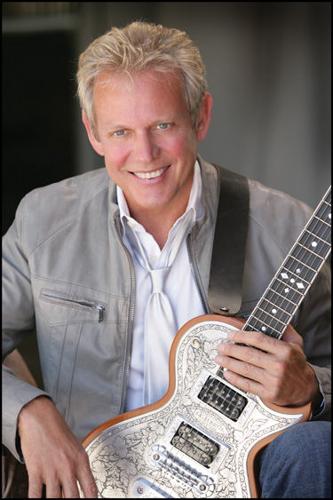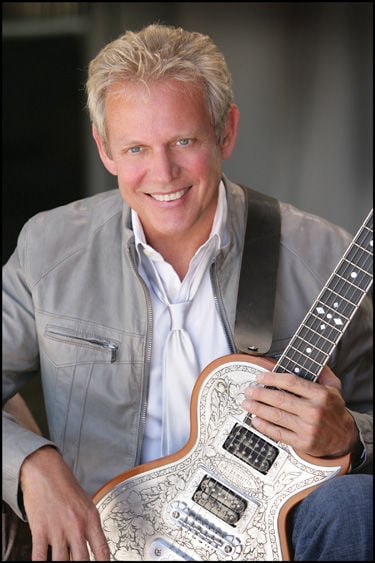
Don Felder’s friend, fellow guitar god, and former Eagles colleague Joe Walsh once penned a popular song that satires the pitfalls of the mega-rockstar lifestyle. Felder himself authored in 2008 a best-selling book that chronicles in more detail and less jest what that behind-the-scenes lifestyle can be like.
Both Rock ‘n’ Roll Hall-of-Famers have hit the heights of musical success, but while Walsh — a one-time wild man whom Felder helped seek sobriety in the late 1980s — still tours with the Eagles, Felder may best be remembered for a surprising dismissal from the band after a 27-year association (1974-2001), and often tumultuous relationship with Eagles’ front men Glenn Frey and Don Henley that’s detailed in his book Heaven and Hell: My Life in the Eagles.
Felder’s success, of course, far overshadows any infamy that may have been born out of a bad band breakup. Besides his New York Times best seller, Felder’s written music for films, television, children’s programs and other musicians. He co-wrote the music for the Eagles’ biggest blockbuster, “Hotel California,” and several of their other hits, and for the past eight years has toured with his own band of thoroughbred musicians. Last month he released just the second solo album of his career, Road to Forever, that features 12 songs suggestive of the guitar-driven sound he is well known for. Atlantic City Weekly recently spoke with Felder in anticipation of his Nov. 16 show at Golden Nugget.
How has the new record been received by your fan base so far?
(Laughs) You know, I had a great deal of trepidation about releasing a record myself. I recorded a solo record in the early ’80s (entitled Airbourne), and when I did I had been on the road for about 11 months out of the year. The first eight or 10 years of my kids’ lives I was an absentee father. This time around I found it a completely different experience. I’ve had a band of my own now for eight years, my kids are all grown and married and out on their own. I had a joyous experience in the studio putting together this record with a bunch of great players who are not only amazing players for their musical ability, but for their very positive energy. You’ve probably heard that all the studio work in the past with the Eagles were less than joyous, very contentious, and not exactly fun to be in the studio with. So it was a completely different feeling for me. When I finished I was very proud of those songs that I had written and co-written with some friends of mine, but I still had some trepidation about releasing it. Once it was out, though, the response I got from those who reviewed the record, the fans on Facebook, and all the people who came out to the shows, was very positive and well received.
How else has producing and marketing music changed most since you first started as a musician?
In the ’70s all the radio stations were owned by mom-and-pops, whether it was in Atlanta or Dallas or Chicago or New York, they weren’t controlled by one monster corporation like Clear Channel [Communications, Inc.], and anybody would play anything on their radio station that they liked. They followed suggestions for formats, but each DJ kind had his own take on what he wanted to play on his own show. Now it’s kind of gotten to somewhat of a conglomerate approach to play-lists and control of broadcasting. All the brick-and-mortar companies have pretty much gone away as far as record sales — there are very few places where you can go and buy a physical copy of a record without ordering it online. The record companies have pretty much abandoned their old format as far as production and promotion and distribution and everything now. The way they sign artists and the way they make deals now, it’s in what I think is a great state of flux — it gives a lot of people the opportunity to expose themselves through the Internet or independent releases or their own promotion, whereas before, unless you were with a major label, you didn’t really have the chance to expose yourself, per se, on a national level.
It’s been both really good and bad. The only thing I regret about the whole transformation of the music industry is that MP3s sound terrible when compared to the level of what you hear in the studio when you’re making a record — so compressed and degraded that if you’re listening through those tiny little ear buds, the quality of what we used to call hi-fidelity has just disappeared. I think there’s a resurgence of vinyl and turntables and people using tube amps and getting away from that digital delivery. And the artwork on vinyl used to be really big, where you could see liner notes, read all the facts, information and credits that go along with the songs. I think that’s been a loss along the way.
I listened to an interview you did with Adam Carolla where you and he talk about having to write ideas down right away when you get inspired for new material. Where does most of your inspiration for songs come from?
You never know when the inspiration for a song is going to strike. It may be driving down the street and seeing something on the side of the road or walking down the street. I have my iPhone with me all the time and it has a little dictation program in it, and I can just turn it on, sing or talk, whether I’m driving in a car, at home, in the studio — if I get struck with an idea I can throw it down before it goes away, because a day or two later, it’s gone. I can never quite recall what it was I was thinking, or have the same feel, inspiration, idea or energy behind it. I’m constantly scribbling stuff down on legal pads, singing it into my iPhone, trying to capture that moment or take a little Polaroid of it before fine-tuning it in the studio.
Who else is in your band?
I have some amazing players in my band. Everyone in the band has a sterling, substantial pedigree, and I mean by the artists they’ve worked with in the past, the records they’ve made, the entire package. Timothy Drury, my keyboardist, was on the road with us during the Eagles’ Hell Freezes Over tour. He and I left the band around the same time, and we became really close friends during that tour. He’s a great writer and great player, and a brilliant musician. My guy on drums is Scott Deavours, who was out with Roger Daltrey and often tours with The Who when their regular drummer Zak (Starkey, Ringo Starr’s son] is not drumming for them. Frank Simes, my guitar player, is also The Who’s musical director and he’s currently out with them until about mid-February. When they finish he’ll come back with me. In his absence I have another amazing guitar player named Greg Suran, who was in the Goo Goo Dolls for about five years. I have a great bass player named Shem von Schroeck, who’s an operatically trained tenor and actually sings opera once or twice a year. He’s a great singer and bass player who sometimes goes out on tour with Kenny Loggins, Michael McDonald and others.
What can the audience expect to hear in A.C.?
About 60 percent of my show are songs that I either co-wrote, recorded or toured with the Eagles for the 27 years I was with the band, like “Hotel California,” “Victim of Love,” “Heartache Tonight,” “Life in the Fast Lane,” “New Kid in Town” — a lot of those songs we made together and co-wrote and/or recorded together. I do a tip-of-the-hat to Stevie Ray Vaughn, I do (the Vaughn) song “Pride and Joy,” which gives me a chance to rock out and play the blues. I do a song I wrote for an animate movie called “Heavy Metal,” I do probably three or four songs from the new record — it’s about an hour and 45 minutes, sometimes two hours if I yammer in between songs. It’s songs most people know the lyrics to, they’ll be dancing to the last four or five songs. It’s a good time, a rockin’ time. I plan on bringing some joy and rock-and-roll vibes to Atlantic City.
Honestly, I’ve played some of the biggest arenas and stadiums in the world, but some of these smaller showrooms have much better sound and there’s much more intimacy. The people get a real special look at the music and how it’s played instead of sitting in the back of a big stadium looking at a big video monitor. It’s a different way to present music, and I personally prefer it. It’s so impersonal to walk on stage with 30, 40 or 50 thousand people where you can only see the first five or 10 rows, and then it’s just a sea of heads. It’s much more personal to play in smaller arenas.
Don Felder
Where: The Showroom at Golden Nugget, Atlantic City
When: Friday, Nov. 16, 9pm
How Much: $29.95 general admission; $38.95 premier seating
See More Upcoming Casino Concerts in Atlantic City
See the AC Weekly Local Music Guide
